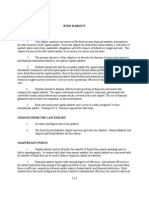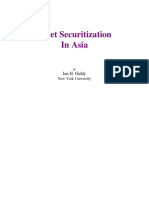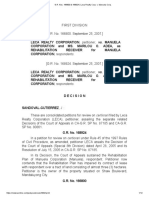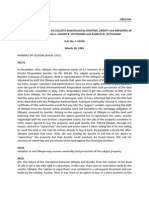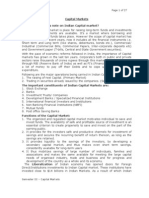0 ratings0% found this document useful (0 votes)
31 viewsImportance of The International Capital Market
Importance of The International Capital Market
Uploaded by
diva cahyani1. The international capital market connects borrowers and lenders across national borders, allowing companies and governments to obtain financing from foreign investors.
2. It expands the money supply and reduces borrowing costs for companies in countries with small domestic capital markets or developing economies.
3. The growth of the international capital market has been driven by advances in information technology, deregulation of national markets, and new financial instruments like securitization.
Copyright:
© All Rights Reserved
Available Formats
Download as DOCX, PDF, TXT or read online from Scribd
Importance of The International Capital Market
Importance of The International Capital Market
Uploaded by
diva cahyani0 ratings0% found this document useful (0 votes)
31 views5 pages1. The international capital market connects borrowers and lenders across national borders, allowing companies and governments to obtain financing from foreign investors.
2. It expands the money supply and reduces borrowing costs for companies in countries with small domestic capital markets or developing economies.
3. The growth of the international capital market has been driven by advances in information technology, deregulation of national markets, and new financial instruments like securitization.
Original Description:
aa
Original Title
Lo 3
Copyright
© © All Rights Reserved
Available Formats
DOCX, PDF, TXT or read online from Scribd
Share this document
Did you find this document useful?
Is this content inappropriate?
1. The international capital market connects borrowers and lenders across national borders, allowing companies and governments to obtain financing from foreign investors.
2. It expands the money supply and reduces borrowing costs for companies in countries with small domestic capital markets or developing economies.
3. The growth of the international capital market has been driven by advances in information technology, deregulation of national markets, and new financial instruments like securitization.
Copyright:
© All Rights Reserved
Available Formats
Download as DOCX, PDF, TXT or read online from Scribd
Download as docx, pdf, or txt
0 ratings0% found this document useful (0 votes)
31 views5 pagesImportance of The International Capital Market
Importance of The International Capital Market
Uploaded by
diva cahyani1. The international capital market connects borrowers and lenders across national borders, allowing companies and governments to obtain financing from foreign investors.
2. It expands the money supply and reduces borrowing costs for companies in countries with small domestic capital markets or developing economies.
3. The growth of the international capital market has been driven by advances in information technology, deregulation of national markets, and new financial instruments like securitization.
Copyright:
© All Rights Reserved
Available Formats
Download as DOCX, PDF, TXT or read online from Scribd
Download as docx, pdf, or txt
You are on page 1of 5
1.
IMPORTANCE OF THE INTERNATIONAL CAPITAL MARKET
A capital market is a system that allocates financial resources in the form of debt
and equity according to their most efficient uses. Its main purpose is to provide a
mechanism through which those who wish to borrow or invest money can do so efficiently.
Individuals, companies, governments, mutual funds, pension funds, and all types of
nonprofit organizations participate in capital markets. For example, an individual might
want to buy her first home, a midsized company might want to add production capacity,
and a government might want to support the development of a new wireless
communications system. Sometimes, these individuals and organizations have excess cash
to lend, and, at other times, they need funds.
a. Purposes of National Capital Markets
There are two primary means by which companies obtain external financing: debt
and equity. National capital markets help individuals and institutions borrow the money
that other individuals and institutions want to lend. Although in theory borrowers could
search individually for various parties who are willing to lend or invest, this would be an
extremely inefficient process.
Role of Debt
Debt consists of loans, for which the borrower promises to repay the borrowed
amount (the principal) plus a predetermined rate of interest. Company debt normally
takes the form of bonds—instruments that specify the timing of principal and interest
payments. The holder of a bond (the lender) can force the borrower into bankruptcy if
the borrower fails to pay on a timely basis. Bonds issued for the purpose of funding
investments are commonly issued by private-sector companies and by municipal,
regional, and national governments.
Role of Equity
Equity is part ownership of a company in which the equity holder participates with
other part owners in the company’s financial gains and losses. Equity normally takes
the form of stock—shares of ownership in a company’s assets that give shareholders
(stockholders) a claim on the company’s future cash flows. Shareholders may be
rewarded with dividends—payments made out of surplus funds—or by increases in the
value of their shares. Of course, they may also suffer losses due to poor company
performance and thus experience a decrease in the value of their shares. Dividend
payments are not guaranteed but are determined by the company’s board of directors
and are based on financial performance. In capital markets, shareholders can sell one
company’s stock for that of another or can liquidate them—exchange them for cash.
Liquidity, which is a feature of both debt and equity markets, refers to the ease with
which bondholders and shareholders can convert their investments into cash.
b. Purposes of The International Capital Market
The international capital market is a network of individuals, companies, financial
institutions, and governments that invest and borrow across national boundaries. It consists
of both formal exchanges (in which buyers and sellers meet to trade financial instruments)
and electronic networks (in which trading occurs anonymously). This market makes use of
unique and innovative financial instruments specially designed to fit the needs of investors
and borrowers located in different countries. Large international banks play a central role
in the international capital market. They gather the excess cash of investors and savers
around the world and then channel this cash to borrowers across the globe.
Expands The Money Supply for Borrowers
The international capital market is a conduit for joining borrowers and lenders in
different national capital markets. A company that is unable to obtain funds from
investors in its own nation can seek financing from investors elsewhere. The option of
going outside the home nation is particularly important to firms in countries with small
or developing capital markets of their own.
Reduces The Cost of Money for Borrowers
An expanded money supply reduces the cost of borrowing. Similar to the prices of
potatoes, wheat, and other commodities, the “price” of money is determined by supply
and demand. If its supply increases, its price—in the form of interest rates—falls. That
is why excess supply creates a borrower’s market, forcing down interest rates and the
cost of borrowing. Projects regarded as infeasible because of low expected returns
might be viable at a lower cost of financing.
Reduces Risk for Lenders
The international capital market expands the available set of lending opportunities.
In turn, an expanded set of opportunities helps reduce risk for lenders (investors) in two
ways:
1) Investors enjoy a greater set of opportunities from which to choose. They can thus
reduce overall portfolio risk by spreading their money over a greater number of
debt and equity instruments. In other words, if one investment loses money, the loss
can be offset by gains elsewhere.
2) Investing in international securities benefits investors because some economies are
growing while others are in decline. For example, the prices of bonds in Thailand
may follow a pattern that is different from bond-price fluctuations in the United
States. Thus, investors reduce risk by holding international securities whose prices
move independently. Would-be borrowers in developing nations often face
difficulties trying to secure loans. Interest rates are often high, and borrowers
typically have little or nothing to put up as collateral. For some unique methods of
getting capital to small business owners in developing nations, see this chapter’s
Global Sustainability feature, titled “Big Results from Microfinance.”
c. Forces Expanding The International Capital Market
Around 40 years ago, national capital markets functioned largely as independent
markets. But since that time, the amount of debt, equity, and currencies traded
internationally has increased dramatically. This rapid growth can be traced to three main
factors:
information Technology
Information is the lifeblood of every nation’s capital market because investors need
information about investment opportunities and their corresponding risk levels. Large
investments in information technology over the past two decades have drastically
reduced the costs, in both time and money, of communicating around the globe.
Investors and borrowers can now respond in record time to events in the international
capital market. The introduction of electronic trading that can occur after the daily close
of formal exchanges also facilitates faster response times.
Deregulation
Deregulation of national capital markets has been instrumental in the expansion of the
international capital market. The need for deregulation became apparent in the early
1970s, when heavily regulated markets in the largest countries were facing fierce
competition from less regulated markets in smaller nations. Deregulation increased
competition, lowered the cost of financial transactions, and opened many national
markets to global investing and borrowing. But the pendulum is now swinging the other
direction as legislators demand tighter regulation to help avoid another global financial
crisis like that of 2008–2009
Financial Instruments
Greater competition in the financial industry is creating the need to develop innovative
financial instruments. One result of the need for new types of financial instruments is
securitization—the unbundling and repackaging of hard-to-trade financial assets into
more liquid, negotiable, and marketable financial instruments (or securities). For
example, a mortgage loan from a bank is not liquid or negotiable because it is a
customized contract between the bank and the borrower. But agencies of the U.S.
government, such as the Federal National Mortgage Association, guarantee mortgages
against default and accumulate them as pools of assets. Securities that are backed by
these mortgage pools are then sold in capital markets to raise capital for investment.
Securitization is criticized for the excessive debt that financial institutions took on in
the boom years prior to 2007. When investors lost faith in securities backed by sub-prime
mortgages, they sold their investments and helped spark the global credit crisis of 2008–
2009. Although the trigger for the crisis was lost value in mortgage-backed securities,
legislators soon began exploring the option of placing reasonable limits on securitization
in order to discourage an appetite for excessive levels of debt.
d. World Financial Centers
The world’s three most important financial centers are London, New York, and
Tokyo. But traditional exchanges may become obsolete unless they continue to modernize,
cut costs, and provide new customer services. In fact, trading over the Internet and other
systems might increase the popularity of offshore financial centers.
Offshore Financial Centers
An offshore financial center is a country or territory whose financial sector features
very few regulations and few, if any, taxes. These centers tend to be economically and
politically stable and tend to provide access to the international capital market through
an excellent telecommunications infrastructure. Most governments protect their own
currencies by restricting the amount of activity that domestic companies can conduct
in foreign currencies. So, companies that find it hard to borrow funds in foreign
currencies can turn to offshore centers. Offshore centers are sources of (usually
cheaper) funding for companies with multinational operations. Offshore financial
centers fall into two categories:
1) Operational centers
Operational centers see a great deal of financial activity. Prominent operational
centers include London (which does a good deal of currency trading) and
Switzerland (which supplies a great deal of investment capital to other nations).
2) Booking centers
Booking centers are usually located on small island nations or territories with
favorable tax and/or secrecy laws. Little financial activity takes place here. Rather,
funds simply pass through on their way to large operational centers. Booking
centers are typically home to offshore branches of domestic banks that use them
merely as bookkeeping facilities to record tax and currency-exchange information.
Some important booking centers are the Cayman Islands and the Bahamas in the
Caribbean; Gibraltar, Monaco, and the Channel Islands in Europe; Bahrain and
Dubai in the Middle East; and Singapore in Southeast Asia.
You might also like
- Capital MarketDocument6 pagesCapital Marketmdsabbir100% (1)
- Phoenix Management Helps Rental Property Owners Find Renters andDocument1 pagePhoenix Management Helps Rental Property Owners Find Renters andAmit PandeyNo ratings yet
- Benefits of The International Capital Market: Unit 5 SectionDocument4 pagesBenefits of The International Capital Market: Unit 5 SectionBabamu Kalmoni JaatoNo ratings yet
- CH - 12 (Global Capital Market)Document24 pagesCH - 12 (Global Capital Market)AhanafNo ratings yet
- Capital MarketsDocument8 pagesCapital Marketsrupeshmore145No ratings yet
- Module 11Document7 pagesModule 11Trayle HeartNo ratings yet
- Navigation Search: Capital Markets AreDocument15 pagesNavigation Search: Capital Markets AreDeepak SharmaNo ratings yet
- Capital MarketDocument15 pagesCapital Marketरजनीश कुमारNo ratings yet
- Questions Chapter TwoDocument5 pagesQuestions Chapter TwoRose Sánchez0% (1)
- Capital Market: From Wikipedia, The Free EncyclopediaDocument8 pagesCapital Market: From Wikipedia, The Free EncyclopediaAvneetPalSinghNo ratings yet
- fmim.16.Ch11B ChapterDocument8 pagesfmim.16.Ch11B ChapterAhmed MujtabaNo ratings yet
- BFM NotesDocument10 pagesBFM Notesravitejaraviteja11111No ratings yet
- Primary Primary Secondary? Secondary SecondaryDocument6 pagesPrimary Primary Secondary? Secondary SecondaryblacroseNo ratings yet
- Financial System and MarketsDocument17 pagesFinancial System and MarketsDipesh GautamNo ratings yet
- Chapter 1Document10 pagesChapter 1tamirat tadeseNo ratings yet
- Debt Securities MarketDocument3 pagesDebt Securities MarketSean ThyrdeeNo ratings yet
- Financial MarketDocument8 pagesFinancial MarketDesiree Manaytay100% (1)
- BBMF2103 ITF Tutorial 3Document6 pagesBBMF2103 ITF Tutorial 3christyyjx-wp20No ratings yet
- Ashwini ReportDocument49 pagesAshwini ReportKavya SonuNo ratings yet
- Lesson 1,2,3 - FinmarDocument10 pagesLesson 1,2,3 - FinmarDesiree ManaytayNo ratings yet
- Ty Bba Project1Document39 pagesTy Bba Project1Shivam KharuleNo ratings yet
- Financial Markets LowDocument17 pagesFinancial Markets LowNelsonMoseMNo ratings yet
- Capital Market: Versus Money MarketsDocument21 pagesCapital Market: Versus Money MarketsVienNo ratings yet
- 09 Chapter 2Document76 pages09 Chapter 2Roshan RahejaNo ratings yet
- Benavidez, Ramcie A. Bsba FM TF-7:00-8:30pm 4FM6Document3 pagesBenavidez, Ramcie A. Bsba FM TF-7:00-8:30pm 4FM6Ramcie Aguilar BenavidezNo ratings yet
- Financial Markets (Chapter 8)Document4 pagesFinancial Markets (Chapter 8)Kyla DayawonNo ratings yet
- Chapter - IDocument9 pagesChapter - IHabte WorkuNo ratings yet
- Chapter 12 The Bond MarketDocument7 pagesChapter 12 The Bond Marketlasha KachkachishviliNo ratings yet
- F383MHNLecture1 S1 2024 For CanvasDocument44 pagesF383MHNLecture1 S1 2024 For CanvasC2SoraNo ratings yet
- Money and Capital Markets 8526Document11 pagesMoney and Capital Markets 8526mariamehdi22No ratings yet
- 2015 ProjectDocument76 pages2015 ProjectVaibhavRanjankarNo ratings yet
- Capital MarketDocument8 pagesCapital MarketAbhinav KuchhalNo ratings yet
- Fin 4303 Chapter 8 ContentDocument10 pagesFin 4303 Chapter 8 Contentsxsy8124100% (1)
- Capital MarketDocument8 pagesCapital MarketAbhinav KuchhalNo ratings yet
- Money Markets and Capital MarketsDocument4 pagesMoney Markets and Capital MarketsEmmanuelle RojasNo ratings yet
- Asset Securitization in Asia: Ian H. GiddyDocument30 pagesAsset Securitization in Asia: Ian H. Giddy111No ratings yet
- Financial Institutions NotesDocument12 pagesFinancial Institutions NotesSherif ElSheemyNo ratings yet
- Credit MarketsDocument12 pagesCredit MarketsDarlyn CarelNo ratings yet
- Module FINANCIAL MARKETS CHAPT 1Document8 pagesModule FINANCIAL MARKETS CHAPT 12023303601No ratings yet
- Worksheet 3 AnswersDocument13 pagesWorksheet 3 AnswersKUMARI PUJA-MBANo ratings yet
- Tema 7. Global Capital Markets and Gains From TradeDocument6 pagesTema 7. Global Capital Markets and Gains From Tradeot2023juantinNo ratings yet
- FM Assignment AnswersDocument4 pagesFM Assignment Answerskarteekay negiNo ratings yet
- Financial Market ActivityDocument6 pagesFinancial Market ActivityKenneth BactulNo ratings yet
- DraftDocument54 pagesDraftkajalNo ratings yet
- Examples of Financial MarketsDocument3 pagesExamples of Financial Marketskate trishaNo ratings yet
- PDF Document 2Document26 pagesPDF Document 2geraldine biasongNo ratings yet
- Capital Markets.Document32 pagesCapital Markets.api-3727090No ratings yet
- The Market For AssetDocument37 pagesThe Market For AssetStephen OgollaNo ratings yet
- Into Its Benefits As Well As The New Risks and Challenges It Has Generated. Forces Driving GlobalizationDocument7 pagesInto Its Benefits As Well As The New Risks and Challenges It Has Generated. Forces Driving Globalizationaks_swamiNo ratings yet
- Dolly Jain 2GI2BA035Document41 pagesDolly Jain 2GI2BA035RahulNo ratings yet
- Capital Market ManagementDocument27 pagesCapital Market ManagementBielan Fabian GrayNo ratings yet
- 8th Batch QuestionDocument6 pages8th Batch Questionmdkhairulalam19920No ratings yet
- Effective Financial SystemDocument5 pagesEffective Financial SystemMartin LiuNo ratings yet
- Money MarketDocument4 pagesMoney Marketyaphets0116No ratings yet
- Business and The Financial Markets Chapter 03Document50 pagesBusiness and The Financial Markets Chapter 03James KuruvalakaNo ratings yet
- Chapter 2 PDFDocument9 pagesChapter 2 PDFarwa_mukadam03No ratings yet
- Capital Markets - National and International: Foreign Exchange MarketDocument5 pagesCapital Markets - National and International: Foreign Exchange MarketAmardeep Kumar DheerNo ratings yet
- Financial Markets Fundamentals: Why, how and what Products are traded on Financial Markets. Understand the Emotions that drive TradingFrom EverandFinancial Markets Fundamentals: Why, how and what Products are traded on Financial Markets. Understand the Emotions that drive TradingNo ratings yet
- Littleton (1929: Value and Price in Accounting. The Accounting Review 4Document3 pagesLittleton (1929: Value and Price in Accounting. The Accounting Review 4diva cahyaniNo ratings yet
- LO 3: Outline The Functions of The Foreign Exchange MarketDocument3 pagesLO 3: Outline The Functions of The Foreign Exchange Marketdiva cahyaniNo ratings yet
- Bedford and Ziegler (1975Document6 pagesBedford and Ziegler (1975diva cahyaniNo ratings yet
- Ethics of Job DiscriminationDocument8 pagesEthics of Job Discriminationdiva cahyaniNo ratings yet
- Paper Akmen, by MeDocument12 pagesPaper Akmen, by Mediva cahyaniNo ratings yet
- Definition of Ethics and MoralsDocument6 pagesDefinition of Ethics and Moralsdiva cahyaniNo ratings yet
- Group 2Document8 pagesGroup 2diva cahyaniNo ratings yet
- Government Budget and SurplusesDocument4 pagesGovernment Budget and Surplusesdiva cahyaniNo ratings yet
- Perhitungan PPH 21 - Bukan Pegawai 2Document3 pagesPerhitungan PPH 21 - Bukan Pegawai 2diva cahyaniNo ratings yet
- Menu Explanation 1.1Document2 pagesMenu Explanation 1.1diva cahyaniNo ratings yet
- Men Explanation 1.3Document3 pagesMen Explanation 1.3diva cahyaniNo ratings yet
- Epc Contracts Process Plant SectorDocument30 pagesEpc Contracts Process Plant Sectorlimpama100% (2)
- Enhancing Smes Access To Green Finance About The AuthorDocument5 pagesEnhancing Smes Access To Green Finance About The Authorrammi1318No ratings yet
- Methods of LendingDocument4 pagesMethods of LendingGaurav GuptaNo ratings yet
- 6-G.R. Nos. 166800 & 168924 - Leca Realty Corp. v. Manuela CorpDocument12 pages6-G.R. Nos. 166800 & 168924 - Leca Realty Corp. v. Manuela CorpPat EspinozaNo ratings yet
- Financial MarketDocument8 pagesFinancial MarketDileep Kumar SinghNo ratings yet
- Rti 10 Adv SchemeDocument35 pagesRti 10 Adv SchemeNasir AhmedNo ratings yet
- Expo 2020Document4 pagesExpo 2020Saher SeherNo ratings yet
- Historical Sketch of Sturgeon PointDocument28 pagesHistorical Sketch of Sturgeon PointMattias ThatchNo ratings yet
- Financial Remediation FrameworkDocument5 pagesFinancial Remediation FrameworkForeclosure FraudNo ratings yet
- Acknowledgment Receipt: Loan Account Number: 3901092273Document1 pageAcknowledgment Receipt: Loan Account Number: 3901092273HERMAN DAGIONo ratings yet
- Juan JabonDocument15 pagesJuan Jabonjohn vidadNo ratings yet
- Filinvest v. Philippine AcetyleneDocument4 pagesFilinvest v. Philippine AcetyleneEmir MendozaNo ratings yet
- BCCI Rules and RegulationsDocument32 pagesBCCI Rules and Regulationsashok1259No ratings yet
- Math 2FM3, Fall 2016, Lecture 10: 2.2.3 Continuous Annuities (Continued)Document5 pagesMath 2FM3, Fall 2016, Lecture 10: 2.2.3 Continuous Annuities (Continued)Lucas KrennNo ratings yet
- Subprime Crisis and Its Impact On India: Group No - 1Document15 pagesSubprime Crisis and Its Impact On India: Group No - 1Sonu Mumbai PuneNo ratings yet
- Golden Age 1919Document220 pagesGolden Age 1919Fernando RossiNo ratings yet
- Fouzul Khan, Robert Parra - Financing Large Projects - Using Project Finance Techniques and Practices-Prentice Hall (2003) PDFDocument672 pagesFouzul Khan, Robert Parra - Financing Large Projects - Using Project Finance Techniques and Practices-Prentice Hall (2003) PDFnguyen duongNo ratings yet
- ComlawDocument60 pagesComlawBrave NeventuraNo ratings yet
- Subcontractor Pre QualificationDocument3 pagesSubcontractor Pre Qualificationbsdbuilderssd100% (1)
- SHREE DURGA PLASTICS (Prop. Akhilesh Kumar) : Cost of The ProjectDocument8 pagesSHREE DURGA PLASTICS (Prop. Akhilesh Kumar) : Cost of The ProjectRamesh GuptaNo ratings yet
- De Doc 4Document14 pagesDe Doc 4DUNgNo ratings yet
- OBLICON CASE ART. 1255 Vda de Zulueta vs. OctavianoDocument2 pagesOBLICON CASE ART. 1255 Vda de Zulueta vs. OctavianoTrizha ReamicoNo ratings yet
- BPI Investment Corp v. CADocument4 pagesBPI Investment Corp v. CAPaolo BrillantesNo ratings yet
- Practice Practical 2Document4 pagesPractice Practical 2parmar shyam50% (2)
- Consultation FamilylawDocument21 pagesConsultation FamilylawpraharshithaNo ratings yet
- Pgdba - Fin - Sem III - Capital MarketsDocument27 pagesPgdba - Fin - Sem III - Capital Marketsapi-3762419100% (1)
- Successful Business PlanDocument161 pagesSuccessful Business Plansk91222100% (7)
- Fair Housing Justice Center Inc., Et. Al. v. Ulster Savings BankDocument33 pagesFair Housing Justice Center Inc., Et. Al. v. Ulster Savings BankDaily FreemanNo ratings yet
- 112 - Ajudhia Prasad and Another v. Chandan Lal and Another (860-879)Document20 pages112 - Ajudhia Prasad and Another v. Chandan Lal and Another (860-879)PIYUSH SHARMANo ratings yet
































